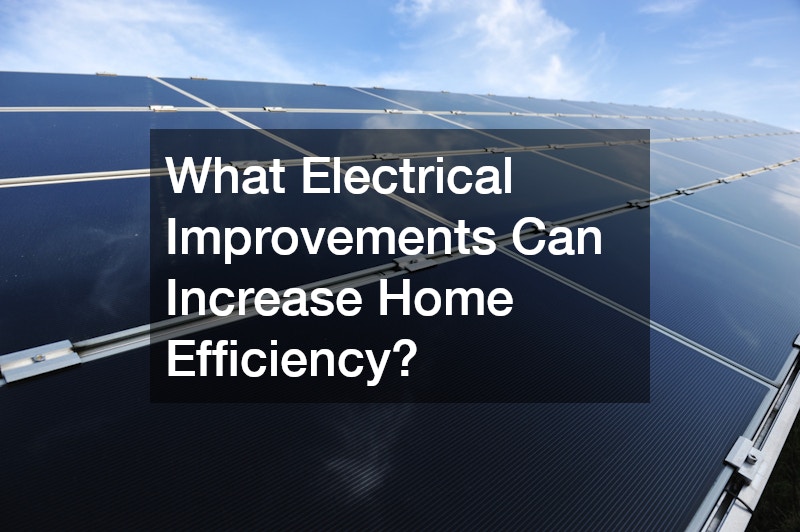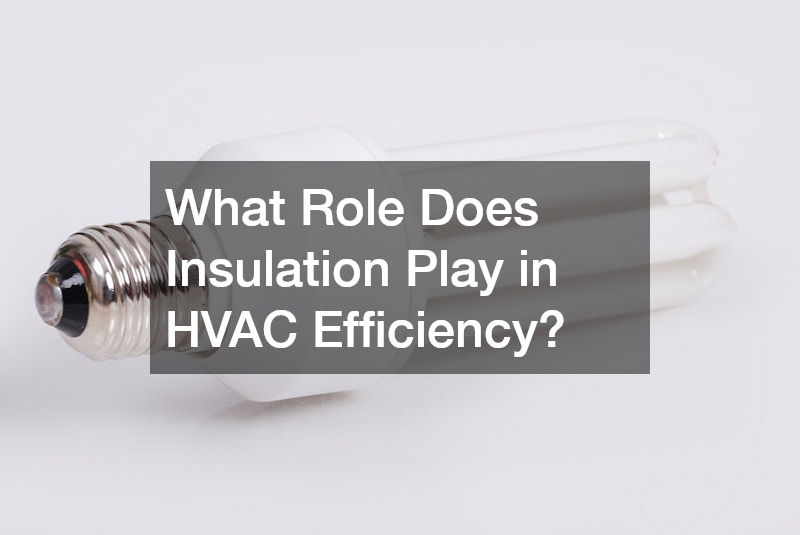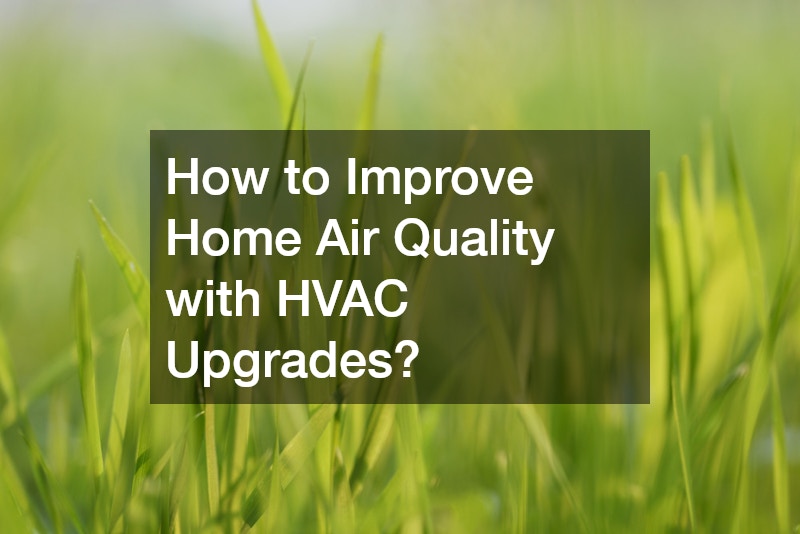HVAC and Electrical Improvements for a More Efficient Home
Introduction
In today’s world, where energy costs are rising and environmental consciousness is a growing concern, making your home more energy-efficient is more than a smart move—it’s essential. Two of the most significant contributors to energy consumption in your home are your HVAC system and electrical infrastructure. By focusing on strategic upgrades and routine maintenance, homeowners can dramatically reduce their energy use, cut down on monthly bills, and create a more comfortable and sustainable living environment. From HVAC service to water heater replacement and the role of your local electrician or plumber, this article explores how to maximize home efficiency while improving indoor air quality and reducing your carbon footprint.
What are the Benefits of Upgrading Your HVAC System?

Increased Energy Efficiency
One of the primary benefits of upgrading your HVAC system is significantly increased energy efficiency. Modern systems are designed to use less power while providing better performance. Features such as variable-speed motors, advanced compressors, and smart thermostats allow for more precise temperature control and energy use. Regular HVAC service plays a vital role in keeping these systems operating at peak efficiency year-round.
Improved Indoor Air Quality
Today’s HVAC units come equipped with high-performance filtration systems that are crucial for maintaining excellent indoor air quality. These filters can capture allergens, dust, mold spores, and other airborne contaminants that older systems might miss. Regular maintenance, including filter changes and duct cleaning, ensures that your HVAC system not only heats and cools effectively but also supports a healthier indoor environment.
Enhanced Comfort Levels
Modern HVAC systems offer superior comfort through consistent airflow, better temperature regulation, and customizable zone control. Whether you’re installing a new furnace or upgrading to a smart thermostat, these improvements eliminate hot and cold spots and allow every room in your house to maintain the desired temperature. HVAC contractors can help assess your specific comfort needs and recommend the best solutions.
Environmental Impact Reduction
Energy-efficient HVAC systems consume less fossil fuel and electricity, reducing greenhouse gas emissions. Many systems now use eco-friendly refrigerants that are less damaging to the environment. With the help of experienced HVAC contractors, homeowners can select systems that meet high-efficiency standards while minimizing their environmental footprint.
Long-term Cost Savings
Although upgrading your HVAC system requires an initial investment, the long-term financial benefits often outweigh the upfront cost. Efficient systems reduce energy bills, require fewer furnace repairs, and often come with extended warranties. Additionally, many jurisdictions offer rebates and tax incentives for high-efficiency HVAC installations, making them even more financially appealing.
How Does Regular Maintenance Improve Electrical Systems?
Preventing System Failures
Just like HVAC systems, your home’s electrical infrastructure benefits greatly from regular maintenance. A licensed electrician can inspect wiring, outlets, and panels to catch small issues before they turn into costly failures. Preventative maintenance not only avoids inconvenient outages but also protects your appliances and sensitive electronics from damage.
Extending Equipment Lifespan
Electrical systems that are regularly serviced tend to last significantly longer. By tightening connections, testing load capacities, and replacing worn-out components, your local electrician helps ensure your electrical setup runs efficiently and safely for many years.
Ensuring Safety and Compliance
Electrical safety should never be overlooked. Regular maintenance ensures that your system complies with current codes and safety standards. This is especially important in older homes where outdated wiring might pose a serious risk. An experienced electrician can recommend necessary upgrades to bring your system up to code, ensuring a safe living environment.
Optimizing Operational Efficiency
From HVAC units to water heaters, nearly every home appliance relies on electricity. A well-maintained electrical system ensures consistent voltage levels and optimal performance. This can prevent unnecessary energy waste and help your systems, such as your furnace or water heater, run more efficiently.
Reducing Energy Consumption
Reducing energy consumption starts with identifying inefficiencies in your electrical system. Maintenance performed by a qualified local electrician can detect issues like energy leaks, overloaded circuits, and outdated panels, all of which contribute to higher energy bills. Addressing these concerns results in more efficient power use and cost savings.
What Electrical Improvements Can Increase Home Efficiency?

Installing Energy-Efficient Lighting
Upgrading to LED lighting is a simple yet impactful improvement that reduces energy use and lowers utility costs. LEDs last much longer than traditional bulbs and consume a fraction of the electricity. An electrician can help install dimmer switches, motion sensors, and smart lighting systems to further enhance your lighting efficiency.
Using Smart Home Technology
Smart thermostats, lighting, and energy monitors give homeowners unprecedented control over their energy use. These systems adapt to your routines, automatically adjusting settings to reduce energy consumption. For example, integrating a smart thermostat with your HVAC can lead to significant savings by reducing unnecessary heating or cooling.
Upgrading Electrical Wiring
Homes with outdated wiring often face energy inefficiencies and safety hazards. A local electrician can assess the condition of your wiring and recommend upgrades that improve capacity and efficiency. This is especially important if you’re adding new high-demand systems, such as an upgraded water heater or HVAC unit.
Incorporating Solar Power Systems
Solar energy systems not only reduce your reliance on grid electricity but also increase your home’s overall efficiency. Paired with energy storage solutions, solar panels can power everything from your HVAC system to your water heater. An electrician and a solar installer often work together to ensure a seamless integration of renewable energy into your home.
Implementing Advanced Metering Solutions
Smart meters provide detailed data on your energy usage, allowing you to identify trends and inefficiencies. These systems can be installed by your utility provider or a certified electrician and offer real-time insights that can help you make informed decisions about your home’s energy consumption.
How to Choose the Right HVAC System for Your Home?
Assessing Home Size and Layout
Every home has unique heating and cooling needs. Selecting the right HVAC system starts with a professional assessment of your home’s size, layout, and insulation quality. HVAC contractors use this information to recommend appropriately sized equipment, ensuring optimal performance without energy waste.
Understanding Energy Ratings
Efficiency ratings such as SEER and HSPF are crucial when comparing HVAC systems. Higher ratings indicate better performance and lower energy consumption. HVAC contractors can help explain these ratings and guide you to options that meet both your budget and efficiency goals.
Comparing Reviews and Warranties
Customer reviews and manufacturer warranties offer valuable insight into product reliability. Systems with long warranties and strong consumer feedback are generally more durable and efficient. Always check these details when comparing HVAC options.
Consulting with HVAC Professionals
Working with reputable HVAC contractors ensures you receive expert guidance throughout the selection and installation process. These professionals evaluate your specific needs, recommend suitable systems, and ensure everything is installed correctly and safely.
Evaluating Long-term Costs and Benefits
While upfront costs are important, the long-term savings of an energy-efficient HVAC system often outweigh the initial expense. Fewer furnace repairs, reduced energy use, and potential rebates all contribute to a strong return on investment.
What Role Does Insulation Play in HVAC Efficiency?

Understanding R-Values in Insulation
The effectiveness of insulation is measured using R-values, which indicate resistance to heat flow. Higher R-values offer better insulation. Choosing the right insulation based on your climate and home design is essential for reducing your HVAC system’s workload.
Impact on Heating and Cooling Loads
Proper insulation minimizes heat loss in winter and heat gain in summer, allowing your HVAC system to maintain consistent temperatures with less effort. This leads to lower energy consumption and improved system longevity.
Insulation Types and Their Benefits
Common insulation materials include fiberglass, spray foam, and cellulose. Each type offers different advantages in terms of performance, installation ease, and cost. HVAC contractors often work alongside insulation professionals to recommend the best option for your home.
Proper Installation Techniques
Even high-quality insulation can underperform if not installed correctly. Ensuring airtight sealing around vents, ducts, and outlets is crucial. Poor installation can lead to energy leaks that strain your HVAC system and raise your utility bills.
Improving Insulation for Extended Efficiency
Over time, insulation can deteriorate or become less effective. Upgrading insulation in attics, walls, and crawlspaces can lead to noticeable energy savings. Proper insulation also supports other systems, including your water heater, by maintaining ambient temperatures.
Can Smart Thermostats Save You Money?
Features of Smart Thermostats
Smart thermostats come with advanced features like remote control, geofencing, and learning algorithms that adapt to your routine. These tools help your HVAC system run only when needed, improving efficiency and lowering costs.
Learning Capabilities and Usage Patterns
Smart thermostats learn your heating and cooling preferences, adjusting settings automatically to match your habits. This reduces unnecessary HVAC use while maintaining comfort.
Integration with Smart Devices
These thermostats integrate with smart home systems, allowing coordination with lighting, fans, and security devices. A local electrician or HVAC contractor can help with installation and setup, ensuring compatibility and optimal performance.
Energy Monitoring and Reports
Energy usage reports help homeowners understand consumption patterns and identify areas for improvement. These insights support smarter energy decisions, from thermostat settings to HVAC service scheduling.
Calculating Return on Investment
Though smart thermostats have an upfront cost, the long-term savings can be substantial. Many homeowners recover their investment in under two years thanks to reduced heating and cooling bills.
How to Conduct an Electrical Audit at Home?
Identifying High-Consumption Appliances
Appliances like HVAC systems, ovens, and water heaters are among the biggest energy consumers. A thorough audit helps identify which appliances are responsible for high energy use, allowing you to prioritize upgrades or replacements.
Analyzing Power Usage Trends
Using smart meters or energy monitors, you can track when and how energy is being used in your home. These tools help identify inefficiencies, such as running a water heater during peak hours.
Spotting Faulty Wiring and Connections
Faulty wiring can waste electricity and pose fire risks. A licensed electrician can identify issues such as frayed wires or overloaded circuits and recommend safe, efficient solutions.
Employing Energy Audit Tools
Professionals use infrared cameras, multimeters, and load testers to assess system efficiency. These tools can pinpoint heat loss, phantom loads, and voltage drops, providing actionable insights.
Implementing Audit Findings for Savings
Following an audit, you can implement targeted improvements, such as upgrading a water heater, installing energy-efficient lighting, or replacing aging HVAC units. These changes lead to meaningful reductions in energy use and utility costs.
What Are the Latest HVAC Technologies?
Variable Refrigerant Flow Systems
VRF systems allow for independent temperature control in different zones of your home. These systems adjust refrigerant flow based on demand, making them one of the most efficient HVAC technologies available.
Geothermal Heat Pumps
Geothermal systems use stable underground temperatures to heat and cool your home efficiently. Though installation is costly, the long-term savings and environmental benefits make this an attractive option.
Ductless Mini-Split Systems
Mini-split systems offer an efficient solution for homes without existing ductwork. They provide targeted comfort and are ideal for additions, garages, or rooms with unique heating and cooling needs.
High-Efficiency Particulate Air Filters
HEPA filters significantly improve indoor air quality by removing microscopic particles. These filters are especially useful in homes with pets, allergies, or respiratory concerns.
Advanced HVAC Control Systems
Modern control systems use artificial intelligence and remote monitoring to optimize performance. These systems adjust HVAC settings automatically based on real-time data, reducing energy waste.
How to Improve Home Air Quality with HVAC Upgrades?

Using Air Purifiers and Cleaners
Integrating air purifiers into your HVAC system can eliminate bacteria, dust, and allergens. These devices improve indoor air quality and support healthier living conditions.
Maintaining HVAC Filters Regularly
Dirty filters reduce airflow and decrease system efficiency. Routine filter replacement is one of the easiest ways to maintain air quality and system performance.
Implementing Ventilation Enhancements
Installing energy recovery ventilators improves airflow while preserving energy. These systems remove stale indoor air and bring in fresh outdoor air without overworking your HVAC system.
Utilizing Humidification Systems
Balancing humidity levels supports respiratory health and improves comfort. Modern HVAC systems often include integrated humidifiers to help maintain optimal indoor air quality.
Reducing Allergen and Pollutant Levels
Through proper filtration, purification, and ventilation, HVAC systems can dramatically reduce indoor allergens and pollutants. This is especially beneficial for families with health concerns.
What are the Cost Implications of Electrical Upgrades?
Calculating Initial Investment Costs
Upgrades such as rewiring, panel replacements, or installing a new water heater can be costly upfront. However, these improvements often pay off through better efficiency and fewer repairs.
Exploring Government Incentives
Many regions offer rebates, tax credits, and grants for energy-efficient upgrades, including HVAC service and water heater replacement. A local electrician or HVAC contractor can help identify available programs.
Estimating Monthly Savings on Bills
Energy-efficient systems consume less power, leading to lower monthly bills. Whether it’s an upgraded HVAC system or a new energy-efficient water heater, the savings can be substantial over time.
Evaluating Payback Periods
The payback period is the time it takes to recoup your investment through energy savings. Most electrical and HVAC improvements pay for themselves within five to ten years.
Considering Financing Options
Financing options are often available through utility companies, manufacturers, or third-party lenders. These options make it easier to afford upgrades without compromising on quality or efficiency.
Enhancing your home’s energy efficiency is a multifaceted process that involves careful consideration of both HVAC and electrical systems. From upgrading to modern HVAC technologies to replacing your water heater and working with skilled HVAC contractors, electricians, and plumbers, every step contributes to a more comfortable, cost-effective, and environmentally friendly home. By integrating smart technologies, performing regular maintenance, and taking advantage of incentives, you can significantly improve indoor air quality, reduce energy consumption, and enjoy long-term savings. With the right team of professionals and a commitment to efficiency, your home can become a model of modern, sustainable living.


